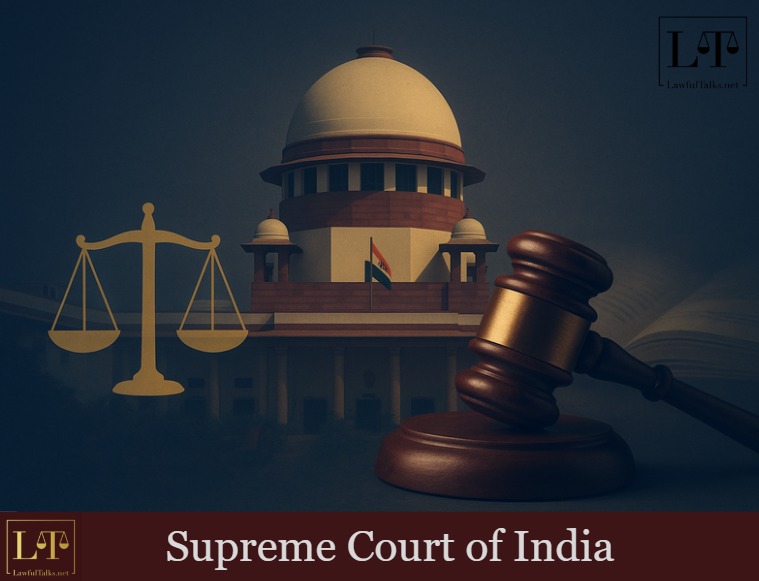Allahabad HC Sets Aside Afzal Ansari's Conviction, Allows Him to Continue as MP

The Supreme Court of India has recently clarified the limits of a Trial Court’s powers, ruling that offences not included in a police chargesheet cannot be added merely on the basis of affidavits filed by private witnesses. The bench of Justice Ahsanuddin Amanullah and Justice S.C. Sharma emphasized that any such addition must be supported by investigation records or by ordering a further probe, and not by relying on private affidavits alone.

The judgment makes it clear that private affidavits cannot replace proper investigation. Trial Courts must independently apply their mind, relying on the full records to ensure fairness in criminal proceedings.
Background
The case began with an FIR registered under several provisions of the IPC, including Section 394 (voluntarily causing hurt in committing or attempting robbery), Sections 452, 323, 504 and 506, along with provisions of the SC/ST Act. After investigation, however, the police filed a chargesheet that left out Section 394.
The complainant, dissatisfied with this, made repeated applications. Eventually, the trial Court took cognizance of Section 394, relying only on fresh affidavits filed by the complainant’s witnesses. The Allahabad High Court upheld this order, leading to the present appeal before the Supreme Court.
The Supreme Court set aside the High Court’s order, noting that the Trial Court had not formed an independent view on the applicability of Section 394 IPC.
The bench strongly disapproved of the Trial Court’s approach, stating:
“In fact, only on the basis of affidavits of witnesses filed along with the petition on behalf of the complainant, the Court has taken cognizance under Section 394 of the IPC. We do not approve of such an exercise in the manner it has been done.”
The Court made it clear that adding offences in this way is not acceptable. Trial Courts must rely on proper investigation material or, if necessary, order a further probe to ensure fairness.
The bench pointed out that the Trial Court should have asked for the entire police case diary, with all the witness statements included. It also highlighted that the prosecution hadn’t shared the full statements recorded under Section 161 CrPC, which made it impossible for the Court to carry out its own independent assessment.
Laying down the correct procedure, the Court explained:
“In the present case, we find that the manner in which the exercise has been conducted is not in accordance with law. After the matter being remanded by the High Court, it was incumbent upon the Trial Court to form a satisfaction of its own with regard to applicability of Section 394 of the IPC independently, based on the materials produced either by the complainant or by the defence and from the investigating agency or in the alternative to conduct the inquiry of its own. In the present case, when the allegation was that witnesses had made certain statements before the Police, which was recorded under Section 161 of the Code of Criminal Procedure, 1973 (for short, the “Cr.P.C.”), it was the duty of the prosecution to produce all such statements to the Court, which was not done. Then obviously, the Trial Court was required to call upon the Police to produce the entire case diary recording the complete statements of all the witnesses. Thereafter, upon perusing the same, especially, the portions which had not been forwarded to the Court earlier, the Trial Court could have formed an independent opinion as to whether ingredients of various Sections including Section 394 of the IPC were made out. This has not happened.”
The court directed that the Trial Court must summon the full case diary under Section 172 CrPC and, if any statements were missing, forward the affidavits to the police for proper recording.
It set aside the cognizance order and sent the matter back, laying down clear directions to make sure the investigation is free and impartial. It directed:
“For reasons aforesaid, the order taking cognizance against the appellants is set aside. The matter is remanded to the Trial Court, which is directed to call upon the Police to produce the entire investigation and statements of the witnesses which has been recorded. Further, if the Police has missed out recording the statement of any of the witnesses, the affidavits of the witnesses as furnished by the complainant shall be forwarded to the Police. The Police shall then, carry further investigation and submit a further report to the concerned Court. The same will be done within six weeks from today. Based upon that, the Court after hearing all concerned, shall proceed to the stage of taking cognizance and thereafter, framing of charge and proceeding with the trial, as the case may be. We make it clear that we have not expressed any opinion on the merits of the matter.”
Additionally, the bench also stressed accountability, stating that the Superintendent of Police, Jhansi, would be personally liable if any material discovered during investigation was suppressed.
Case Title: DEEPAK YADAV AND ANOTHER VERSUS STATE OF UTTAR PRADESH AND ANOTHER

Nandani Mishra
Second Year, B.SC LLB, (cybersecurity) Hons, National law University
Latest Posts
Categories
- International News 19 Posts
- Supreme Court 390 Posts
- High Courts 383 Posts



















































































































































































































































































































































































































































































































































































































































































































































































































